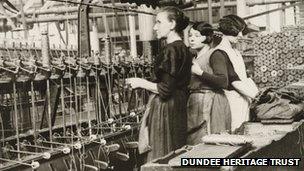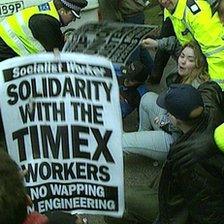Beyond 'Juteopolis': Dundee's changing economic landscape
- Published

Two-thirds of jute mill workers in Dundee were women
Dundee is, of course, famous for jute, jam and journalism, but the city has transformed itself economically many times over the years.
This week, BBC Radio Scotland's Business Scotland programme takes a look at the wider prospects for the city as well as the history of how it has made its money.
"Everybody in my family was in jute mills so I just automatically had no option but going to the mills," says Lily Thomson who began working as a weaver in the jute mills aged 15. Her mother began work at 12, her brothers at 14 years old.
She now does demonstrations for the public visiting the Verdant Works museum in the city. It tells the story of the jute industry.
"I grew up near the mills and I heard them and smelled them. I thought it was very hard, dirty, smelly, noisy. To stay alive everybody had to have work and your work was all dependent on the jute in Dundee."
Dundee has always been a textile town - wool in the Middle Ages, then by the 18th Century, linen.
But problems with the supply of flax coincided with the East India Company looking to bring back raw jute from India, and so Dundee began a journey which ended up with it being known as "Juteopolis".
At its peak in about 1900, the industry employed 40,000-50,000 people. Jute was used for a wide variety of uses, including sacking, wagon covers for America's west, the backing of carpets and linoleum.
Jute did not just bring direct jobs to the city.
There were also many engineering firms and foundries supplying steam engines and textile processing machinery, while port expansion saw men and boys employed off-loading at the docks and carters transporting raw jute bales through the streets.

At its peak, the jute industry employed up to 50,000 people
"Two out of three of the workers were women," says Gill Poulter, heritage director of the Dundee Heritage Trust, which runs the Verdant Works museum.
She explains that males were often laid off at 18 years old, because at that point they could command an adult male wage and - in the days before equal pay legislation - women and children could simply be paid less.
"Dundee women are known as being strong and feisty," she says, "and that was because they were the key breadwinners for their family and that gave them that extra responsibility and power.
"There were over 100 mills and foundries, so you can imagine the physical impact on the landscape with the number of buildings and warehouses and chimneys.
"And then there was obviously the economic impact of being so reliant on one industry, ultimately not a sustainable model for the city."
New era
Eventually the Dundee jute business lost out to lower-priced competition from India and despite attempts to find new uses for it, the advent of materials like polypropylene contributed to the industry's demise.
The end of World War II brought a new economic phase to Dundee.
In the 1930s the city council tried to encourage investment from industries other than jute, but without much success.
But after the war, American cash machine company NCR arrived in the city. In 1946 Timex came to Dundee and by the 1980s was producing ZX Spectrum home computers.
"People will remember members of their family who worked in NCR and Timex," says Charlie Malone, who started working at Timex as a 17-year-old. He argues that at least part of what attracted the company to the city was a dextrous female workforce.

A bitter industrial dispute erupted over the former Timex factory in 1993
"They referred to it as 'the Timex' and 'the NCR' or 'the cash' and the word 'the' is the important part because it reflects the status of these companies in Dundee as probably the most important private sector employers in Dundee's economic history as a single contained entity."
And this was part of a wider process. Legislation had been passed in 1945 to encourage firms to move into declining industrial areas across Britain, with grants to inward-coming manufacturers.
Post-war success
"Dundee like other parts of Scotland was then very successful in the early post-war period, in the 1950s and the 1960s, in attracting investment, particularly from American multi-national corporations," says Prof Jim Tomlinson of Glasgow University.
"So for 30 years or so after the second war, Dundee did see big influxes of new jobs, particularly in those multi-nationals."
But that period came to an end. Standing at the gates of what used to be the Timex factory, Charlie Malone recalls 1993 and the bitter industrial dispute which saw it close its doors.

Dundee is being promoted as a city "on the up" as it bids to become the 2017 UK City of Culture
"This gate where we're standing just now, this is where the buses used to come in on a daily basis, this is where people met and on a couple of occasions we had in excess of 3,000 people down here, giving us solidarity."
At that time he was chair of the strike committee, but now he is a business lecturer at the city's Abertay University.
"The legacy of Timex was to move from mechanical to electronics into computing and I still see the remnants now," he adds.
"If I speak to some of my colleagues in computer games, computer media, they still remember the ZX 81 that they got from Timex, so the legacy is still there.
"The legacy, politically maybe not, but the legacy industrially is absolutely still there."
Present-day Dundee has made it onto the shortlist for the 2017 UK City of Culture.
It also has a vibrant university sector and is redeveloping its links with its waterfront. But are there lessons to be learned from history?
"The lesson - and I'm not sure how helpful it is - is that on the one hand no job lasts forever," says Prof Tomlinson.
"I don't know what the next phase will be, but I think one needs to think that there will have to be other avenues of employment in the city to develop, if it's to sustain anything like its current employment levels."
You can hear more about how Dundee's economic landscape has changed over the years in Radio Scotland's Business Scotland programme on Sunday at 10:00. It will also be available by free download.
- Published2 May 2013